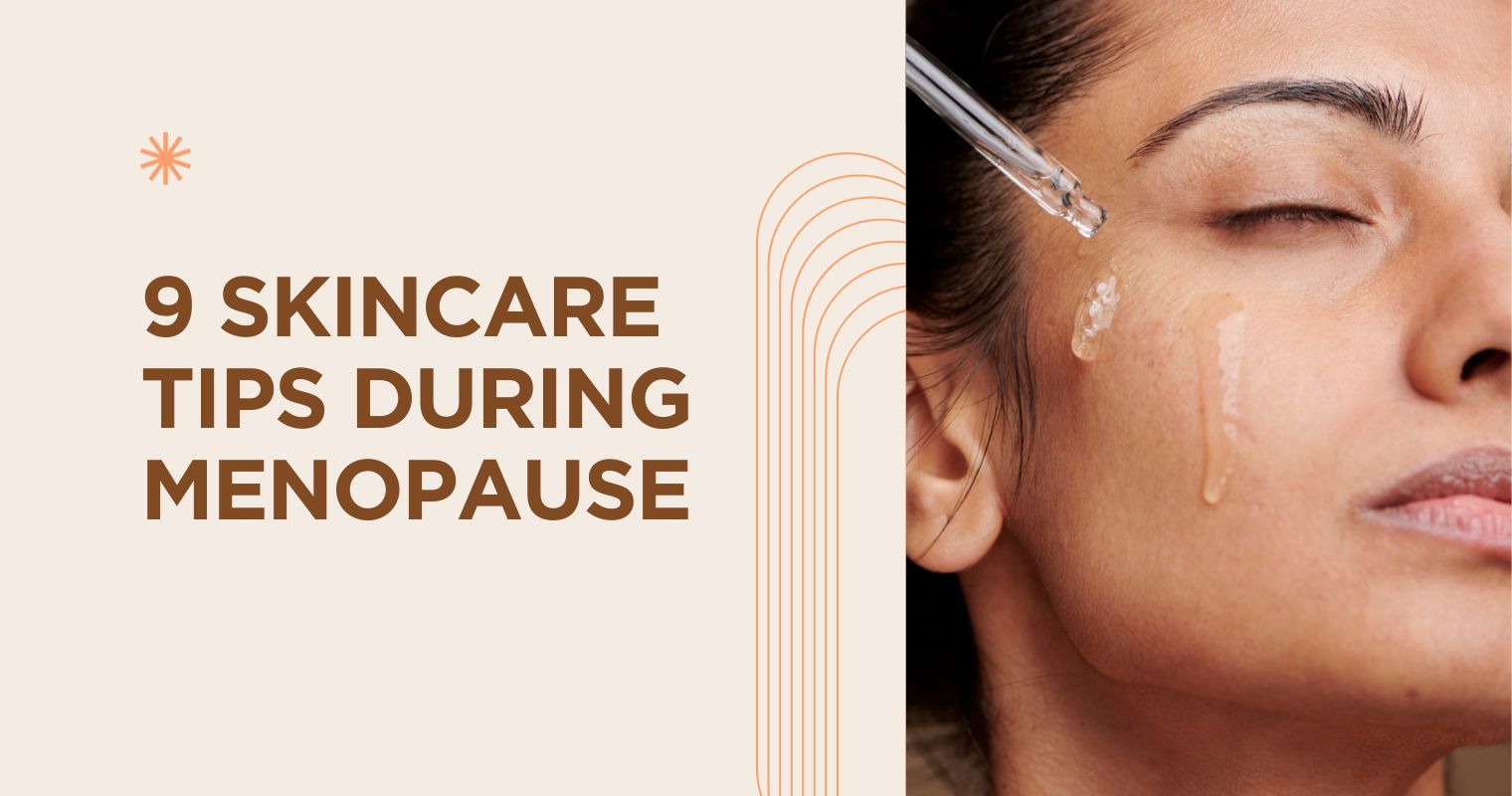Menopause is a natural stage in a woman’s life that typically begins one year after her last menstrual period. While it brings about various changes in the body, one aspect that often gets overlooked is its impact on the skin.
As hormone levels decline, the skin undergoes noticeable changes, including dryness, thinning, and increased vulnerability to various skin issues. However, with the right care and attention, you can minimize these effects and maintain healthy, radiant skin throughout menopause. In this blog post, we’ll explore valuable menopause skin care tips recommended by dermatologists.
1. Addressing Thin Skin
The decline in estrogen levels during menopause can result in thinner skin, making it more susceptible to bruising.
What You Can Do:
- Sunscreen: As previously mentioned, daily sunscreen application can’t thicken your skin but can help prevent further thinning. [1]
- Dermatologist Consultation: Consult a dermatologist to explore treatment options. Some women may benefit from retinoid creams or laser treatments to address thinning skin.
2. Combating Dry Skin
Menopause often leads to decreased skin moisture retention, which becomes more apparent in dry environments.
What You Can Do:
- Mild Cleanser: Use a mild cleanser instead of traditional soap, which can be overly drying for mature skin.
- Moisturize: Apply a moisturizer with ingredients like hyaluronic acid or glycerin after bathing and throughout the day when your skin feels dry.
- Dermatologist Consultation: If your skin remains dry despite these measures, consult a dermatologist for personalized recommendations. They may suggest exfoliation or microdermabrasion, but it’s essential to seek professional guidance before attempting these treatments at home.
3. Managing Facial Hair Growth
As female hormone levels drop during menopause, some women may experience increased facial hair growth, particularly on the chin, jawline, or upper lip. According to research published in 2020, a rise in facial hair is a typical menopausal symptom brought on by a drop in estrogen. [2]
What You Can Do:
- Consult a Dermatologist: Seek advice from a board-certified dermatologist to determine the best approach for removing unwanted facial hair. Options may include laser hair removal or prescription hair-reduction creams.
- Laser Hair Removal: If you opt for laser hair removal, ensure it is performed by a qualified and trained professional to minimize the risk of side effects and complications.
4. Addressing Thinning Hair on the Scalp
Thinning hair on the scalp is a common concern during menopause, and early intervention is crucial for optimal results.
What You Can Do:
- Dermatologist Consultation: At the first signs of hair thinning, consult a board-certified dermatologist. Treatment options depend on the underlying cause, which can range from hormonal changes to genetics.
- Minoxidil and Laser Treatment: If menopause-related hormonal changes contribute to your hair loss, your dermatologist may recommend minoxidil (a medicine), laser treatments, or a combination of both.
- Hair Transplant: In cases of advanced hair loss, a hair transplant may be a viable option to restore density.
5. Combating Wrinkles and Jowls
According to 2018 research, menopausal skin changes and aging symptoms are associated with reduced oestrogen levels. [3] The reduction in collagen levels during menopause can lead to wrinkles, and the appearance of jowls.
What You Can Do:
- Sun Protection: Shield your skin from the sun to reduce visible wrinkles and prevent new ones from forming.
- Topical Products: Consider using skincare products containing retinol or peptides to stimulate collagen production and improve skin firmness.
6. Managing Menopausal Acne
Some women may experience acne outbreaks reminiscent of their teenage years as hormone levels fluctuate during menopause.
The number of cases of acne during and after menopause has been the subject of varying research, but a 2021 study concluded that hormonal changes are probably contributing factors. [4]
What You Can Do:
- Salicylic Acid Cleanser: Use a gentle cleanser containing salicylic acid to unclog pores without overly drying your skin.
- Avoid Drying Products: Steer clear of acne products that can exacerbate dryness.
- Dermatologist Consultation: If you struggle to control acne, consult a dermatologist for potential hormonal treatments.
7. Rashes and Easily Irritated Skin
Menopausal changes in skin pH can increase sensitivity, leading to rashes and skin irritation, particularly if you have pre-existing skin conditions like eczema or rosacea.
What You Can Do:
- Fragrance-Free Moisturizer: Opt for fragrance-free moisturizers to reduce irritation.
- Dermatologist Consultation: If skin issues persist or worsen, seek guidance from a board-certified dermatologist, as they can provide tailored solutions for your specific needs.
8. Slow Healing Skin
Hormones play a crucial role in skin healing, and during menopause, healing may take longer.
What You Can Do:
- Patience: Be patient; your skin will eventually heal, although it may take longer than before.
- Dermatologist Consultation: If you encounter infections or other skin problems, consult a dermatologist promptly to minimize the risks associated with delayed healing.
Conclusion
Menopause is a transformative phase in a woman’s life, and it’s essential to adapt your skincare routine to address the specific changes that come with it. Consulting a dermatologist can provide personalized guidance and treatments to help you navigate the challenges of menopausal skin and maintain a healthy, radiant complexion.
By prioritizing sun protection, proper skincare, and professional advice, you can embrace this new chapter with confidence and grace, knowing that your skin is receiving the care it deserves.
References
- Baumann, L. “Skin ageing and its treatment.” The Journal of Pathology: A Journal of the Pathological Society of Great Britain and Ireland 211.2 (2007): 241-251.
- Grymowicz M, Rudnicka E, Podfigurna A, Napierala P, Smolarczyk R, Smolarczyk K, Meczekalski B. Hormonal Effects on Hair Follicles. Int J Mol Sci. 2020 Jul 28;21(15):5342. doi: 10.3390/ijms21155342. PMID: 32731328; PMCID: PMC7432488.
- Addor FAS. Beyond photoaging: additional factors involved in the process of skin aging. Clin Cosmet Investig Dermatol. 2018 Sep 20;11:437-443. doi: 10.2147/CCID.S177448
- Khunger N, Mehrotra K. Menopausal Acne – Challenges And Solutions. Int J Womens Health. 2019 Oct 29;11:555-567. doi: 10.2147/IJWH.S174292.

